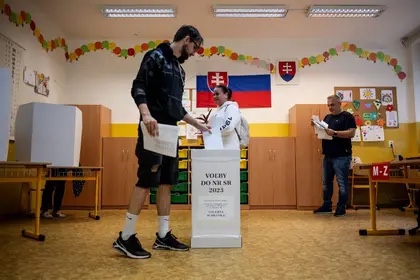Slovaks vote in tight polls key for foreign policy, Ukraine aid

Slovaks voted on Saturday in a tight early election seen as key to whether the country will keep supporting neighboring Ukraine after a campaign marked by disinformation.
Polling stations across the EU and NATO member of 5.4 million people will close at 2000 GMT, with exit polls expected shortly afterwards and the final results due on Sunday morning.

Bratislava voter Daniela Vongrajova said she wanted a change as the “political culture and behavior have sunk very low”.
“And I also think that our children deserve a dignified future,” she told AFP.
Two parties were neck-and-neck in the final opinion polls — the left-wing Smer-SD of populist former premier Robert Fico and the centrist Progressive Slovakia of European Parliament vice-speaker Michal Simecka.
Both parties scored around 20 percent backing, which means the election winner will need help from smaller parties to form a majority coalition in the 150-seat parliament.
The new government will replace a wobbly centre-right coalition in power since 2020, which has seen three cabinets installed over the period and provided hefty military and humanitarian aid to war-stricken Ukraine.
Eliska Spisakova said she voted for Smer, “the natural choice for the working poor, people like me”.
“Progressive Slovakia is not interested in people, only gays, drug legalization, Ukrainians and migrants,” the 29-year-old court employee told AFP after voting in Bratislava.
Independent political analyst Grigorij Meseznikov told AFP the vote would determine Slovakia’s focus “in foreign policy, defense and security policy, but also… the future of democracy”.
In the heated election campaign, Fico took aim at the EU, NATO and the LGBTQ+ minority and rejected providing any further military aid to Ukraine.
Fico cast his ballot in a village northeast of Bratislava, accompanied by his mother.
- ‘Best schnitzel’ –
“In talking to mum I find an awful lot of experience and common sense, and of course she makes the best schnitzel,” Fico said in a video on Facebook after declining to tell journalists when and where he will vote.
He added he wanted Slovakia led without “amateurs and fumblers with no experience who would drag us into adventures such as immigration and the war”.
“And I would like the schnitzel in Slovakia to be bigger and bigger and not smaller and smaller,” he said, playing to his constituents’ comforts of home.
Simecka has urged Slovaks to “elect the future” and vowed to rid Slovakia of “the past”, referring to Fico’s three terms as prime minister.
“I hope that… whatever government comes out of this election will continue to support Ukraine,” he said after voting at a Bratislava school.
Slovakia emerged as an independent country in 1993, following a peaceful split with the Czech Republic after Czechoslovakia shed a totalitarian communist rule of four decades in 1989.
Although many Slovaks have experience with the Moscow-steered communist regime, many will vote for populists vowing to stop helping Ukraine.
Analyses have shown half of the nation is prone to believing disinformation, largely spread by the Kremlin.
“Some think peace can be achieved by stopping any aid to Ukraine, and that’s where I disagree,” Slovak President Zuzana Caputova told AFP.
Ukraine President Volodymyr Zelensky meanwhile thanked Slovakia “for standing with Ukraine” on Telegram on the election day.
- ‘More or less equal’ –
Caputova said she would tap the election winner to form the next cabinet.
The choice of coalition partners is fairly broad, with 11 parties expected to win parliamentary seats.
Fico is likely to woo Smer-SD’s spin-off Hlas-SD, led by former Smer-SD vice-chairman Peter Pellegrini, as a coalition partner.
Pellegrini became premier in 2018 after Fico had to step down amid nationwide protests following the murder of journalist Jan Kuciak and his fiancee.
Kuciak uncovered links between the Italian mafia and Fico’s government in his last article published posthumously.
Fico’s other potential partners are the newly formed far-right Republic and the nationalist Slovak National Party (SNS).
Progressive Slovakia will be looking at the parties of the outgoing centre-right coalition — Freedom and Solidarity, OLaNO, We Are Family and For People.
“The positions of both groupings, national populist and pro-democratic, are more or less equal concerning the support of these parties,” said Meseznikov.
by Laszlo JUHASZ and Jan FLEMR
©️ Agence France-Presse














